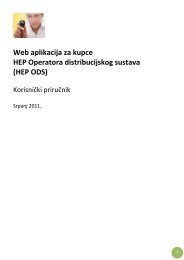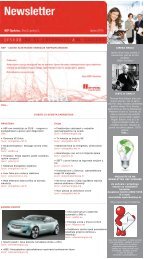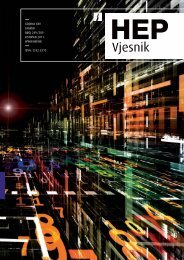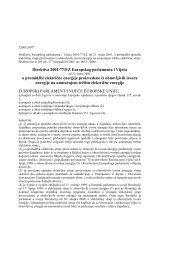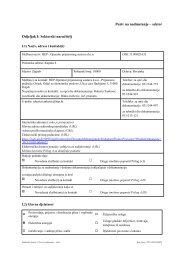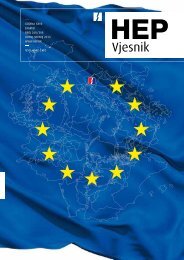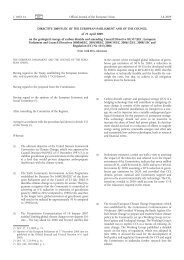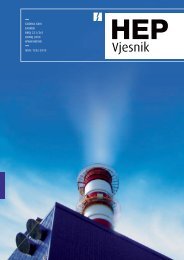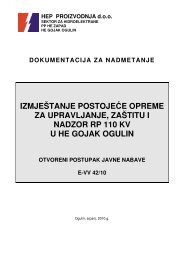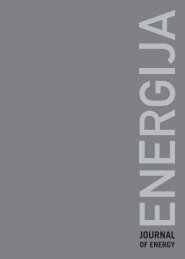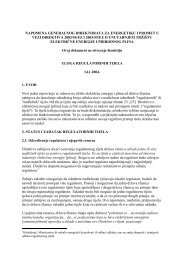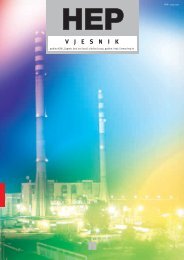DRAVA, KUPA, RJE»INA, LOKVARKA, LI»ANKA LIKA, DOBRA ...
DRAVA, KUPA, RJE»INA, LOKVARKA, LI»ANKA LIKA, DOBRA ...
DRAVA, KUPA, RJE»INA, LOKVARKA, LI»ANKA LIKA, DOBRA ...
You also want an ePaper? Increase the reach of your titles
YUMPU automatically turns print PDFs into web optimized ePapers that Google loves.
186<br />
HEP ANNUAL REPORT 2010<br />
CHAPTER 8 - REPORTS BY OTHER HEP GROUP COMPANIES<br />
HEP-ESCO d.o.o.<br />
GORDANA LU»IΔ<br />
DIRECTOR<br />
AFTER EIGHT YEARS of operating in the energy efficiency market in Croatia, in mid-2010 HEP-ESCO successfully<br />
completed the Energy Efficiency Project supported by the World Bank and GEF. Based on this experience, the business<br />
operations are planned to be supplemented in accordance with trends in energy efficiency and environmental<br />
protection in the EU. Above all, this is related to a combination of renewable sources and energy efficiency measures,<br />
then to offering operating leases to clients and energy savings guarantee and to an increasing orientation to private<br />
sector clients. The new business approaches are necessary if HEP-ESCO is to keep its position in the Croatian energy<br />
efficiency market.<br />
The special characteristic of the business of HEP-ESCO d.o.o. within HEP Group is a full market orientation and<br />
the need for constant development of new lines of business in order to keep and expand the market. This demands<br />
great commitment and enthusiasm from all employees. The aggravating factor is the outdated organization of the<br />
Company and inadequate valuation of jobs.<br />
Securing finance is a key issue for HEP-ESCO because project financing is the basis of the business operations<br />
and/or of contracting with clients on ESCO model. It must be mentioned here that energy efficiency projects push<br />
a country’s economic growth, especially at local levels: project preparation and execution involves solely domestic<br />
small and medium-sized, mainly local, companies (more than 140 until now). In addition, these projects help local<br />
communities (towns and counties) to improve public standard and quality of living by modernizing public lighting,<br />
schools, hospitals, etc. That is to say that the loans extended to HEP ESCO serve in fact the purposes of Croatia’s<br />
economy.<br />
Due to the decreased number of projects in 2010, the achieved income was only 70 percent of the planned<br />
amount. This result was mostly the consequence of the Opinion of the Finance Ministry (February 2010) relating to<br />
the Budget Act (of January 2009) according to which energy efficiency projects on ESCO model represent supplier’s<br />
credit to budget users. This completely stopped preparation and execution of our projects in local self-government<br />
units for which HEP ESCO until then had executed 90 percent of its projects. Our position is that ESCO projects, in<br />
which investment is paid back from savings and which help to solve major communal problems, e.g. in schools and<br />
public lighting, cannot be considered borrowings made by towns or counties. We expect that this problem will be<br />
solved in rules to be derived from the Efficient Use of Energy in Direct Consumption Act which was passed at the<br />
end of 2008.<br />
To the end of 2010, HEP ESCO d.o.o. had contractually agreed 33 projects in a total value of 176 million kuna.<br />
In 2010, 4 projects were contractually agreed in the amount of 29 million kuna. These were: the project in which the<br />
use of solar energy for sanitary water heating was integrated into energy efficiency measures in the meat processing<br />
industry Milivoj Medven (project completed in September 2010), project in the Adria Hotel in Biograd, and two<br />
projects for HEP Toplinarstvo d.o.o. currently being implemented – modernization of the heating system in Velika<br />
Gorica and engineering and economic optimization of the district heating system, in Zagreb.<br />
In the increasingly important area of international collaboration, in 2010 HEP ESCO continued to work on the<br />
EU development programs – Intelligent Energy Europe (IEE). These projects are Bio.Sol-Esco and Permanent. Within<br />
Bio-Sol-Esco we cooperate with ten companies from seven EU countries. The project unites renewable sources and<br />
ESCO model of project preparation, execution and financing. The Permanent project relates to the processes of<br />
measuring and verifying of savings and is carried out in cooperation with five EU countries.



